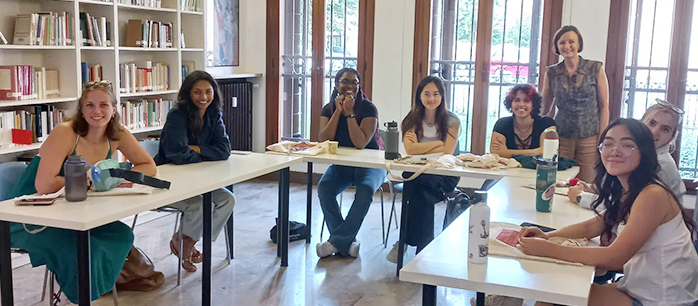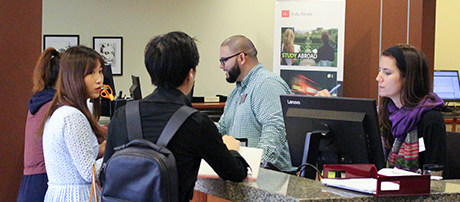Sexuality and sexual orientation can be more or less accepted depending on where you are in the world. It’s important to be prepared for what the local views on the LGBTQIA+ community are. Our office strives for inclusion and safety for all students at all locations, regardless of their sexuality. We acknowledge the intersectional components of overlapping identities, and how they may affect an individual’s experiences in each place. We want to make sure you know how to stay safe and comfortable while navigating your experience in relation to your sexuality. It can be difficult to navigate a conversation about your personal life with your coworkers or host family if you are unsure how accepting they are, just as it is important to know what kind of healthcare you have available to you, and what local dating culture is like, so it’s important to be prepared for the experience.
The following reflection questions may be helpful to consider:
- Will local values and/or country laws affect my decision to study in a particular country, where certain relationships are criminalized?
- Depending on the culture of laws of my host country, will I be able to be open about my identity, or will I want to be more caution with who I share my identity with?
- Does my LGBTQIA+ identity conflict with my host-community’s religious or cultural values or traditions?
- How safe is it for me to be open about my LGBTQIA+ identity in the host-community? Are there laws in place making it unsafe to be open about my sexual identity?
Sexuality and Sexual Orientation Resources
BU Resources & Community:
Additional Resources:
Here are some more resources we found that could be helpful in your pre-departure research:
Coming Out Abroad
Study abroad is a time where students may learn more about their identity. For you that may include aspects of your sexuality that you have never explored before or you are able to explore in new ways within this new environment. Coming out is a process that can be intimidating and exhausting, especially since for most people it’s not just a onetime thing. Study abroad can be a time to explore and experiment and find yourself, but always remember to keep yourself safe and comfortable. We are an inclusive community in all factors of sexual orientation and gender identity, and your site staff and the staff in Boston are here to support you in every way we can, so feel free to reach out to talk to us anytime.
Heteronormativity
There may be instances in conversation with your coworkers at an internship, members of your host-family, or even with your local classroom teachers, the topic of your personal relationships might come up. The assumption may be that you are, or would prefer to be, in a heterosexual relationship. The question “Do you have a boyfriend?” to female students, and “Do you have a girlfriend?” to male students is something that you may encounter during your time abroad. It can be difficult to respond to these personal questions especially if you are queer and don’t know how accepting the local culture is. In general, it is important to remember to measure the situation and see if you feel safe to share. If you feel unsafe, find a way to navigate out of the conversation. It can be helpful to research how accepting your new city is of the queer community before your departure. A good place to start is queerintheworld.com; with breakdowns of attitudes towards the LGBTQIA+ community by country and city, it can be a very helpful resource to help you get started. Your safety always comes first, and our staff is here to help you whenever we can.
Dating
When talking about gender norms and roles around the world, these conversations also extend to dating norms, relationships between people, and local customs surrounding marriage, sex, and relationships. It should be noted that dating practices and attitudes towards premarital and casual sex can be vastly different from norms in the U.S. Every person abroad should take care when entering dating or sexual relationships, as well as in everyday interactions. Students studying abroad should take care not to endanger or act inappropriately with others in their interactions. Dating apps should be used with caution. We encourage all students to do as much research as they can about local dating and sexual norms, as well as customs that govern relationships between unmarried people.
Sexual Health and Safety
Your health and safety are of the utmost importance.. You should have the space to explore your sexuality without stigma, but keep in mind that you have less knowledge around the country’s sexual culture as a foreigner. Make sure to stay safe and be vigilant. It can be helpful to research local hook-up and dating culture, as well as your access to the health system for any needs. Be sure to familiarize yourself with the resources BU provides ahead of departure.
Students have International Health Insurance coverage when participating in BU international Study Abroad programs. We encourage students to contact International SOS for pre-trip planning, so you have a sense of what to expect and have plenty of time to prepare before arriving in your host city. This service is available to students participating in an international program and can be accessed at any time. To learn more about what services are covered while you are abroad you can visit our Health & Safety Information page. If you would like to find out more information about your health insurance or what you will have access to while abroad, you can also reach out to your program manager. BU Study Abroad staff both in Boston and on site will support you as needed.
Safety
All people have the right to live their lives free of harassment or assault based on their gender or gender expression. Those who do experience gender-based violence, including at a location abroad, have the right to seek confidential and compassionate resources and support. Exercising caution when in a new environment is crucial, especially in situations involving alcohol. Site staff at all BU Study Abroad sites will orient all students to medical and safety protocols and be able to respond in real-time to incidents. The Sexual Assault Response and Prevention Center (SARP) at BU provides free, confidential, and responsive support to any member of the BU community who has experienced trauma, and they are prepared to help those abroad.
Health
Planning ahead is important when it comes to your health. If you have health care providers at home, be sure to set a plan with them to make sure you can stay on top of your physical and mental health. If you are taking any medication or hormones, you need to make sure that you have enough of your prescriptions to last you through your time abroad, or that you have access to required medication while abroad. If you have a mental health counselor or therapist, talk to them about the possibility of virtual counseling to make sure you have continued support.
Students have International Health Insurance coverage when participating in our international BU Study Abroad programs. We encourage students to contact International SOS, the plan administrator, for pre-trip planning. This service is available to students participating in an international program and can be accessed at any time. To learn more about what services are covered while you are abroad, you can visit our Health & Safety Information page. For more info on what you will have access to while abroad, you can also reach out to your program manager. Remember that nothing that your body does is shameful, and site staff are always there to help and support you.
Mental Health
Studying abroad can take a toll on your mental health and navigating your place in a new environment while being queer even more so. It is important if you have a counselor, therapist, or mental health provider at home, that you discuss with them the potential impact of studying abroad as well as a plan for things like virtual therapy or keeping up with any medication you might have. Access to counseling varies by site, so make sure to get in touch with your program manager to discuss what your options will be if you are interested in what your counseling options will be while abroad.
While we have not captured every resource for non-straight students on this page, we encourage you to reach out to our office to discuss any questions or concerns that you might have as you prepare for your study abroad experience. If you would like additional resources, or if you have found your own resources that other students could benefit from, please don’t hesitate to contact us at abroad@bu.edu.



